308 scholarly books by CSLI and 14
start with F
308 scholarly books by CSLI and 14
308 scholarly books by CSLI
14 start with F start with F
14 start with F start with F
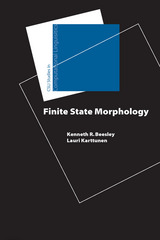
Finite-State Morphology
Kenneth R. Beesley and Lauri Karttunen
CSLI, 2003
The finite-state paradigm of computer science has provided a basis for natural-language applications that are efficient, elegant, and robust. This volume is a practical guide to finite-state theory and the affiliated programming languages lexc and xfst. Readers will learn how to write tokenizers, spelling checkers, and especially morphological analyzer/generators for words in English, French, Finnish, Hungarian, and other languages.
Included are graded introductions, examples, and exercises suitable for individual study as well as formal courses. These take advantage of widely-tested lexc and xfst applications that are just becoming available for noncommercial use via the Internet.
Included are graded introductions, examples, and exercises suitable for individual study as well as formal courses. These take advantage of widely-tested lexc and xfst applications that are just becoming available for noncommercial use via the Internet.
[more]
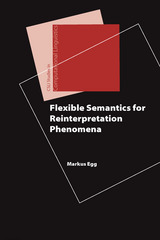
Flexible Semantics for Reinterpretation Phenomena
Markus Egg
CSLI, 2005
Deriving the correct meaning of such colloquial expressions as "I am parked out back" requires a unique interaction of knowledge about the world with a person's natural language tools, e.g., "I have a car that is parked in the back," and not the wrong literal one. In this volume, Markus Egg examines how natural language rules and world knowledge work together to produce correct understandings of expressions that cannot be fully understood through literal reading. An in-depth and exciting work on semantics and natural language, this volume will be essential reading for scholars in computational linguistics.
[more]
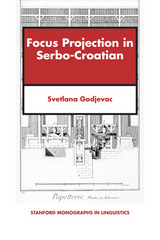
Focus Projection in Serbo-Croatian
Svetlana Godjevac
CSLI, 2004
Research on the English language suggests that the relationship between phonological prominence, word order, and focus—better known as focus projection—is mediated through syntax. This book breaks new ground with its demonstration of how the Serbo-Croatian language shows the workings of this relationship.
Svetlana Godjevac explores the development of focus projection. Further distinguishing her work from the numerous studies of the English language, she analyzes how focus projection in Serbo-Croatian also depends on the semantic type of the prominence bearing element. This volume is an innovative analysis of linguistic theory as well as a study of a lesser examined language.
Svetlana Godjevac explores the development of focus projection. Further distinguishing her work from the numerous studies of the English language, she analyzes how focus projection in Serbo-Croatian also depends on the semantic type of the prominence bearing element. This volume is an innovative analysis of linguistic theory as well as a study of a lesser examined language.
[more]
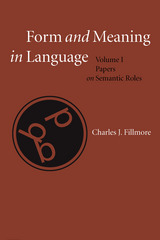
Form and Meaning in Language
Volume I, Papers on Semantic Roles
Charles Fillmore
CSLI, 2003
The early papers collected here trace a trajectory through the work and thinking of Charles Fillmore over his long and distinguished career—reflecting his desire to make sense of the workings of language in a way that keeps in mind questions of language form, language use, and the conventions linking form, meaning, and practice.
[more]

Form and Meaning in Language, Volume II
Papers on Discourse and Pragmatics
Charles J. Fillmore
CSLI, 2020
This volume continues the collection of work by Charles J. Fillmore, which he started in 2003. Taken together, the work gathered in these volumes reflects Fillmore’s desire to make sense of the workings of language in a way that keeps in mind questions of language form, language use, and the conventions linking form, meaning, and practice.
Divided into four parts, the papers collected in Volume II explore language in use; semantics and pragmatics; text and discourse; and language in society.
Divided into four parts, the papers collected in Volume II explore language in use; semantics and pragmatics; text and discourse; and language in society.
[more]

Form and Meaning in Language, Volume III
Papers on Linguistic Theory and Constructions
Charles J. Fillmore
CSLI, 2020
This volume continues the collection of work by Charles J. Fillmore, which he started in 2003. Taken together, the work gathered in these volumes reflects Fillmore’s desire to make sense of the workings of language in a way that keeps in mind questions of language form, language use, and the conventions linking form, meaning, and practice.
Divided into four parts, the papers collected in Volume III explore the organization of linguistic knowledge; the foundations of constructing grammar; construction grammar analyses; and constructions and language in use.
Divided into four parts, the papers collected in Volume III explore the organization of linguistic knowledge; the foundations of constructing grammar; construction grammar analyses; and constructions and language in use.
[more]
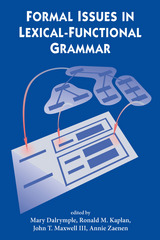
Formal Issues in Lexical-Functional Grammar
Edited by Mary Dalrymple, Ronald M. Kaplan, John Maxwell III, and Annie Zaenen
CSLI, 1994
Lexical-Functional Grammar was first developed by Joan Bresnan and Ronald M. Kaplan in the late 1970s, and was designed to serve as a medium for expressing and explaining important generalisations about the syntax of human languages and thus to serve as a vehicle for independent linguistic research. An equally important goal was to provide a restricted, mathematically tractable notation that could be interpreted by psychologically plausible and computationally efficient processing mechanisms. The formal architecture of LFG provides a simple set of devices for describing the common properties of all human languages and the particular properties of individual languages. This volume presents work conducted over the past several years at the Xerox Palo Alto Research Center, Stanford University, and elsewhere. The different sections link mathematical and computational issues and the analysis of particular linguistic phenomena in areas such as wh-constructions, anaphoric binding, word order and coordination.
[more]
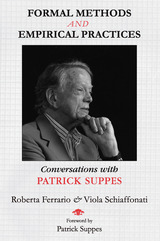
Formal Methods and Empirical Practices
Conversations with Patrick Suppes
Roberta Ferrario and Viola Schiaffonati
CSLI, 2012
The philosopher Patrick Suppes has developed a unique and influential approach to studying the foundations of science—he combines an understanding of the main principles of scientific theories in axiomatic terms and formal models with a hands-on approach. While moving the study of the philosophy of science out of the parlor and into the lab, he often comes up with original results from the psychology of learning to the theory of measurement and quantum mechanics. This book searches for a common thread in Suppes’s multifaceted work through a series of conversations with the man himself and illuminates many of the more challenging aspects of his philosophy.
[more]

Formalizing the Dynamics of Information
Edited by Martina Faller, Stefan Kaufmann, and Marc Pauly
CSLI, 2000
The papers collected in this volume exemplify some of the trends in current approaches to logic, language and computation. Written by authors with varied academic backgrounds, the contributions are intended for an interdisciplinary audience. The first part of this volume addresses issues relevant for multi-agent systems: reasoning with incomplete information, reasoning about knowledge and beliefs, and reasoning about games. Proofs as formal objects form the subject of Part II. Topics covered include: contributions on logical frameworks, linear logic, and different approaches to formalized reasoning. Part III focuses on representations and formal methods in linguistic theory, addressing the areas of comparative and temporal expressions, modal subordination, and compositionality.
[more]
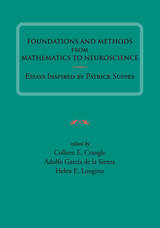
Foundations and Methods from Mathematics to Neuroscience
Essays Inspired by Patrick Suppes
Edited by Colleen E Crangle, Adolfo García de la Sienra, and Helen E. Longino
CSLI, 2014
During his long and continuing scholarly career, Patrick Suppes has contributed significantly both to the sciences and to scientific philosophies. In this volume, an international group of Suppes’s colleagues, collaborators, and students seeks to build upon Suppes’s insights. Each of their essays is accompanied by a response from Suppes himself, which together create a uniquely engaging dialogue. Suppes and his peers explore a diverse array of topics including the relationship between science and philosophy; the philosophy of physics; problems in the foundations of mathematics; theory of measurement, decision theory, and probability; the foundations of economics and political theory; psychology, language, and the philosophy of language; Suppes’s most recent research in neurobiology; and the alignment (or misalignment) of method and policy.
[more]
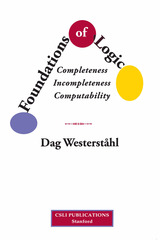
Foundations of Logic
Completeness, Incompleteness, Computability
Dag Westerståhl
CSLI, 2023
A comprehensive introduction to logic’s central concepts.
This book provides a concise but detailed account of modern logic's three cornerstones: the completeness of first-order logic, Gödel's Incompleteness Theorems, and Turing's analysis of computability. In addition to the central text, an appendix explains the required technical terminology and facts. The main ideas behind the three cornerstones are explained in a simple, easy-to-grasp manner, and it is possible to select among the chapters and sections so that the reader becomes familiar with these ideas, even if some technicalities are skipped or postponed. A wealth of exercises accompany a wide selection of materials, including the histories and philosophical implications of the three main premises, making it useful as a textbook for undergraduate or graduate courses focusing on any of the three main themes. The material is rigorous and detailed but keeps the main ideas in sight, and there are numerous excursions into more advanced material for curious readers to explore.
This book provides a concise but detailed account of modern logic's three cornerstones: the completeness of first-order logic, Gödel's Incompleteness Theorems, and Turing's analysis of computability. In addition to the central text, an appendix explains the required technical terminology and facts. The main ideas behind the three cornerstones are explained in a simple, easy-to-grasp manner, and it is possible to select among the chapters and sections so that the reader becomes familiar with these ideas, even if some technicalities are skipped or postponed. A wealth of exercises accompany a wide selection of materials, including the histories and philosophical implications of the three main premises, making it useful as a textbook for undergraduate or graduate courses focusing on any of the three main themes. The material is rigorous and detailed but keeps the main ideas in sight, and there are numerous excursions into more advanced material for curious readers to explore.
[more]

Foundations of Real World Intelligence
Edited by Yoshinori Uesaka, Pentti Kanerva, and Hideki Asoh
CSLI, 2001
Real-world intelligence includes the ability to handle complex, uncertain, dynamic, multi-modal information in real time. In order to pursue the artificial realization of such "human" or "intelligent" information processing, a novel system of representing and interpreting knowledge must first be developed. This book collects the results of ten years of research at six laboratories, focusing on the theoretical and algorithmic foundations of the intelligence we find in the real world.
[more]

From Quirky Case to Representing Space
Papers in Honor of Annie Zaenen
Edited by Tracy Holloway King and Valeria de Paiva
CSLI
Annie Zaenen’s research has broadly influenced the field of linguistics from the underlying architecture of formal theories to the minute details of lexical representation. This volume assembles a wide range of essays from linguists who have been profoundly influenced by Zaenen’s work. Taking Zaenen as a model, the contributors explore a variety of topics, including the mapping of syntax onto argument and the relationship between syntax and semantics. From Quirky Case to Representing Space presents new research in linguistics, but also reasserts Zaenen’s crucial role in the evolution of linguistic theory.
[more]

Fundamental Issues in the Romance Languages
Edited by Danièle Godard
CSLI, 2010
Fundamental Issues in the Romance Languages compares six Romance languages—Catalan, French, Spanish, Italian, Portuguese, and Romanian—and summarizes the last thirty years of scholarship in the fields of morphology, syntax, semantics, and discourse for each language. The up-to-date analyses in this volume make it essential for undergraduate and graduate students as well as scholars of each language.
[more]
READERS
Browse our collection.
PUBLISHERS
See BiblioVault's publisher services.
STUDENT SERVICES
Files for college accessibility offices.
UChicago Accessibility Resources
home | accessibility | search | about | contact us
BiblioVault ® 2001 - 2024
The University of Chicago Press









